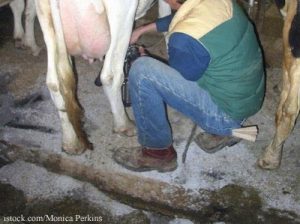Raw milk sold in South Dakota may get a new label that states “Warning. Raw milk. This product has not been pasteurized and may contain harmful bacteria.” The state has proposed two rule changes for the sale of raw milk, which is only permitted directly on the farm or delivered directly to consumers from the farm.
 In October 2012, Agriculture officials in South Dakota found Campylobacter bacteria in raw milk from Black Hills Milk in Belle Fourche, South Dakota. It was discovered during routine testing. A recent National Animal Health Monitoring System survey found that 92.6% of dairy farms had Campylobacter-positive cows. More than 33% of all cows tested were infected; all of the cows were “outwardly healthy”.
In October 2012, Agriculture officials in South Dakota found Campylobacter bacteria in raw milk from Black Hills Milk in Belle Fourche, South Dakota. It was discovered during routine testing. A recent National Animal Health Monitoring System survey found that 92.6% of dairy farms had Campylobacter-positive cows. More than 33% of all cows tested were infected; all of the cows were “outwardly healthy”.
In addition to the label change, the allowed bacterial count per milliliter is going to increase to 30,000 from 20,000. Bottled raw milk must be tested every month for pathogenic bacteria such as Salmonella, Listeria monocytogenes, Campylobacter, and E. coli O157:H7 at an accredited laboratory.
The South Dakota Department of Health web page has this to say about raw milk: “The consumption of raw milk and products made with raw milk poses a significant risk of food-borne illness such as campylobacteriosis, E. coli, salmonellosis, listeriosis, and brucellosis. Adherence to good hygiene practices during milking may reduce the risk of such contamination but does not eliminate that risk. Pasteurization is the only way to ensure that fluid milk products do not contain harmful bacteria. Pasteurization has been widely used for more than 100 years and has significantly improved the public health and safety, preventing contagious diseases from salmonellosis to typhoid fever. Individuals at highest risk for illness from contaminated milk include young children, pregnant women, those with weakened immune systems.”




